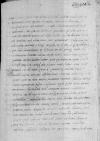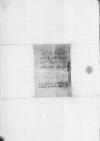 UUB, H. 154, f. 29r
UUB, H. 154, f. 29r
Scripsi ad te superioribus diebus, quod si litterae redditae fuerunt, cur non rescripseris, satis cogitare non possum, nisi forte illecebrae illae Germanicae ita vos avocarunt, ut vestros familiares quasi oblivisci videamini. Nec scio, cur saltim noster Cornelis De Schepper (Cornelius Scepperus, Cornelis De Dobbele, Cornelius Duplicius) (*1503 – †1555), erudite, diplomat in the Habsburgs' service; close friend of Ioannes Dantiscus; initially in the service of Christian II of Oldenburg, King of Denmark; 1526 secretary and councillor to Emperor Charles V of Habsburg (CE, vol. 3, p. 218-220; DE VOCHT 1961, p. 15-24)⌊CorneliusCornelis De Schepper (Cornelius Scepperus, Cornelis De Dobbele, Cornelius Duplicius) (*1503 – †1555), erudite, diplomat in the Habsburgs' service; close friend of Ioannes Dantiscus; initially in the service of Christian II of Oldenburg, King of Denmark; 1526 secretary and councillor to Emperor Charles V of Habsburg (CE, vol. 3, p. 218-220; DE VOCHT 1961, p. 15-24)⌋, qui solet esse iuris amicitiae observantissimus non aliquid scribat, quem ita decrevi litteris non lacessere, nisi ab eo prior fuero provocatus. Estis enim vos, ubi multa cotidie intelligere potestis, et cum amicis quam iucundisime per litteras communicare, et praesertim, an illi plusquam tribunitii Lutheriani terrores aliquo modo sedati adhuc sint. Quantas cotidie turbas videre videor, quot postulationes, quot querelas. Sic est profecto, numquam diu placuit unus status, una vitae conditio, ac dum novum quaerimus, putamusque meliorem nancisci, multum ratione aberrasse deprehendimur. Profecto nulla unquam secta faciet, quin in vita multas sentiamus miserias, sola ut miseriis finem imponamus praestat Christiana. Quid praestat toties mutare caeremonias, sacrificia tollere, respuere ieiunia, confessiones abrogare, si dum illa non erant, numquam quieverint homines, quoad excitarentur? Auferantur haec omnia, sint desides omnino sacerdotes quamquam cumulant nunc illam utramque speciem excindantur monasteria. Profecto postea conquerentur nonnulli esse cultum divinarum rerum tam tenuem, tam ieiunum, tantam esse in templis solitudinem, fuisse apud ethnicos deos vel verius sceleratos daemones pace eorum dixerim colentes tot omnis generis sacerdotes, vestales, sodalitia, collegia, tot pontifices, reges sacrificulos,
 UUB, H. 154, f. 29v
quinimo et ipsosmet reges solitos vacare rebus sacris, manus aris quotidie imponere, nunc vero in unius Dei veri cultu agi tam misere, tam exiliter, tam negligenter. Discamus tandem intelligere esse haec vitia non rerum naturae, sed nostra. Quae paulo ante placebant, nunc displicent, quae nunc displicent, aliquando placebunt. Germania, quae quasi ad superstitionem Christum colebat, nunc paene de abicienda religione cogitare videtur, quasi vero essent ritus nostri temporis, ut erant illorum temporum, dum et bestias et homines diis immolarent, credo putantes illorum admodum nares tali nidore permulceri. Sed de his satis, ne nimium sus apud Minerva Roman goddess identified with Greek Athena, the goddess of wisdom, law and justice, the arts and war⌊MinervamMinerva Roman goddess identified with Greek Athena, the goddess of wisdom, law and justice, the arts and war⌋. At dicere aliquid oportuit, ne me putares ita otio confectum. Sum quidem plane otiosus, ut nulla de re scribere aut cogitare possem. Ego tamen ni tantam annonae caritatem esse apud vos audirem, iam forte istuc accurrissem, et praesertim mortuo iam nostro bono sene Mercurino Arborio di Gattinara (*1465 – †1530), humanist, jurist, trusted and influential advisor to Charles V; 1501 entered the service of the Habsburgs as legal counsel to Duchess Margaret of Austria, 1504 advisor and President of the Privy Council of Margaret of Austria, after the governoship of the Netherlands was entrusted to her, 1518 Grand Chancellor of Castile and later of Charles V as Roman Emperor, 1529 Cardinal of St. Giovanni a Porta Latina (after the death of his wife, Andreetta Avogadro) (DE VOCHT 1961, p. 12; CE, vol. 2, p. 76-80)⌊MercurinoMercurino Arborio di Gattinara (*1465 – †1530), humanist, jurist, trusted and influential advisor to Charles V; 1501 entered the service of the Habsburgs as legal counsel to Duchess Margaret of Austria, 1504 advisor and President of the Privy Council of Margaret of Austria, after the governoship of the Netherlands was entrusted to her, 1518 Grand Chancellor of Castile and later of Charles V as Roman Emperor, 1529 Cardinal of St. Giovanni a Porta Latina (after the death of his wife, Andreetta Avogadro) (DE VOCHT 1961, p. 12; CE, vol. 2, p. 76-80)⌋, sed me nervus belli deficit, qui etiam mihi videtur nervus ceterarum rerum. Et Mehercule forte non nihil debeo fortunae meae, quae sic per inopiam facit, ut labores et pericula itineris evitem. Si tamen vellet Charles V of Habsburg (*1500 – †1558), ruler of the Burgundian territories (1506-1555), King of Spain as Charles I (1516-1556), King of Naples and Sicily, King of the Romans (1519-1530), Holy Roman Emperor of the German Nation (elected 1519, crowned 1530, abdicated 1556); son of Philip I the Handsome and Joanna the Mad of Castile⌊caesarCharles V of Habsburg (*1500 – †1558), ruler of the Burgundian territories (1506-1555), King of Spain as Charles I (1516-1556), King of Naples and Sicily, King of the Romans (1519-1530), Holy Roman Emperor of the German Nation (elected 1519, crowned 1530, abdicated 1556); son of Philip I the Handsome and Joanna the Mad of Castile⌋, ac ut puto deberet, adhuc vos et videre et visere possem, quod tamen fore aliquando, si paululum modo faverit nobis Deus, non omnino despero. Vale.
UUB, H. 154, f. 29v
quinimo et ipsosmet reges solitos vacare rebus sacris, manus aris quotidie imponere, nunc vero in unius Dei veri cultu agi tam misere, tam exiliter, tam negligenter. Discamus tandem intelligere esse haec vitia non rerum naturae, sed nostra. Quae paulo ante placebant, nunc displicent, quae nunc displicent, aliquando placebunt. Germania, quae quasi ad superstitionem Christum colebat, nunc paene de abicienda religione cogitare videtur, quasi vero essent ritus nostri temporis, ut erant illorum temporum, dum et bestias et homines diis immolarent, credo putantes illorum admodum nares tali nidore permulceri. Sed de his satis, ne nimium sus apud Minerva Roman goddess identified with Greek Athena, the goddess of wisdom, law and justice, the arts and war⌊MinervamMinerva Roman goddess identified with Greek Athena, the goddess of wisdom, law and justice, the arts and war⌋. At dicere aliquid oportuit, ne me putares ita otio confectum. Sum quidem plane otiosus, ut nulla de re scribere aut cogitare possem. Ego tamen ni tantam annonae caritatem esse apud vos audirem, iam forte istuc accurrissem, et praesertim mortuo iam nostro bono sene Mercurino Arborio di Gattinara (*1465 – †1530), humanist, jurist, trusted and influential advisor to Charles V; 1501 entered the service of the Habsburgs as legal counsel to Duchess Margaret of Austria, 1504 advisor and President of the Privy Council of Margaret of Austria, after the governoship of the Netherlands was entrusted to her, 1518 Grand Chancellor of Castile and later of Charles V as Roman Emperor, 1529 Cardinal of St. Giovanni a Porta Latina (after the death of his wife, Andreetta Avogadro) (DE VOCHT 1961, p. 12; CE, vol. 2, p. 76-80)⌊MercurinoMercurino Arborio di Gattinara (*1465 – †1530), humanist, jurist, trusted and influential advisor to Charles V; 1501 entered the service of the Habsburgs as legal counsel to Duchess Margaret of Austria, 1504 advisor and President of the Privy Council of Margaret of Austria, after the governoship of the Netherlands was entrusted to her, 1518 Grand Chancellor of Castile and later of Charles V as Roman Emperor, 1529 Cardinal of St. Giovanni a Porta Latina (after the death of his wife, Andreetta Avogadro) (DE VOCHT 1961, p. 12; CE, vol. 2, p. 76-80)⌋, sed me nervus belli deficit, qui etiam mihi videtur nervus ceterarum rerum. Et Mehercule forte non nihil debeo fortunae meae, quae sic per inopiam facit, ut labores et pericula itineris evitem. Si tamen vellet Charles V of Habsburg (*1500 – †1558), ruler of the Burgundian territories (1506-1555), King of Spain as Charles I (1516-1556), King of Naples and Sicily, King of the Romans (1519-1530), Holy Roman Emperor of the German Nation (elected 1519, crowned 1530, abdicated 1556); son of Philip I the Handsome and Joanna the Mad of Castile⌊caesarCharles V of Habsburg (*1500 – †1558), ruler of the Burgundian territories (1506-1555), King of Spain as Charles I (1516-1556), King of Naples and Sicily, King of the Romans (1519-1530), Holy Roman Emperor of the German Nation (elected 1519, crowned 1530, abdicated 1556); son of Philip I the Handsome and Joanna the Mad of Castile⌋, ac ut puto deberet, adhuc vos et videre et visere possem, quod tamen fore aliquando, si paululum modo faverit nobis Deus, non omnino despero. Vale.
 UUB, H. 154, f. 29v
quinimo et ipsosmet reges solitos vacare rebus sacris, manus aris quotidie imponere, nunc vero in unius Dei veri cultu agi tam misere, tam exiliter, tam negligenter. Discamus tandem intelligere esse haec vitia non rerum naturae, sed nostra. Quae paulo ante placebant, nunc displicent, quae nunc displicent, aliquando placebunt. Germania, quae quasi ad superstitionem Christum colebat, nunc paene de abicienda religione cogitare videtur, quasi vero essent ritus nostri temporis, ut erant illorum temporum, dum et bestias et homines diis immolarent, credo putantes illorum admodum nares tali nidore permulceri. Sed de his satis, ne nimium sus apud
UUB, H. 154, f. 29v
quinimo et ipsosmet reges solitos vacare rebus sacris, manus aris quotidie imponere, nunc vero in unius Dei veri cultu agi tam misere, tam exiliter, tam negligenter. Discamus tandem intelligere esse haec vitia non rerum naturae, sed nostra. Quae paulo ante placebant, nunc displicent, quae nunc displicent, aliquando placebunt. Germania, quae quasi ad superstitionem Christum colebat, nunc paene de abicienda religione cogitare videtur, quasi vero essent ritus nostri temporis, ut erant illorum temporum, dum et bestias et homines diis immolarent, credo putantes illorum admodum nares tali nidore permulceri. Sed de his satis, ne nimium sus apud 

